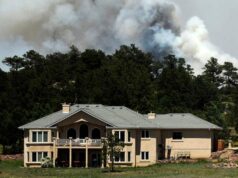
Photo: AP
Jay Inslee, the first presidential climate candidate and noted hottie, is out of the race for the White House. The Democratic Washington governor announced he was ending his campaign on Wednesday night. Despite never really catching fire in the polls, his campaign could very well have altered the course of history for the better.
From the get-go, Inslee’s candidacy was unlike any other in history. He realized, rightly, that climate change affects everything, and the solutions likewise will rework every facet of American life should we have the will to implement them. His campaign’s six individual climate plans, totaling more than 200 pages, laid out a comprehensive vision for what a new America could look like, a country that kicks fossil fuels to the curb, prosecutes wrongdoing, ensures fair wages and a just transition for workers and frontline communities, and transforms agriculture and even how we eat. Speaking with HuffPost, Inslee said the manifesto was more than “just a campaign document, it was a governing document, and it could be used by anyone who ends up in the White House.”
Big Oil Is Scared
Here is a simple truth: The world cannot build more fossil fuel infrastructure and have a habitable …
Read more Read
Whether those plans are picked up, of course, remains to be seen, but Inslee’s true legacy is getting other candidates and the media to pay attention to an issue that didn’t get a single question during the last presidential election. Since then, we’ve been living with the waking nightmare that is the Trump administration’s climate plan, which focuses on exporting “freedom gas” and rolling back regulations.
On the candidate side, Democrats have been racing to put out climate plans like an auction bidding war. Most came in below the Inslee gold standard of leveraging $9 trillion in public and private money to transform the economy, but they largely show candidates are taking the climate crisis seriously in a way they haven’t in past elections when it was just a box to check.
If you don’t see Inslee’s influence in those plans, then perhaps I can point you to moments in the debates—you know, events where candidates try to differentiate themselves—when both Senators Kamala Harris and Cory Booker said they agreed with Inslee on climate. Or perhaps all the warm sendoff tweets thanking Inslee for raising the climate crisis to prominence in the primary season.
Then there’s the media side. The two rounds of debates so far have been meh to pretty good in terms of climate questions. And the questions have come up late in the format both times around. But overall, the political press is finally moving climate out of the environmentalist box and into the serious political one. We’re even getting two nationally televised climate crises town halls next month. That is huge.
It means climate change conversations are going on in millions of Americans’ living rooms, breaking what Yale researchers have called a “spiral of climate silence” where people don’t hear about climate change so they assume others don’t care, which leads to even fewer people talking about the most pressing issue of our time. Ending climate silence is one of the keys to moving climate change closer to the center of our discussions about politics and the future society we want. It’s hard to imagine that media switch flipping without a candidate running on a climate platform forcing them to go there.
Now, of course, Inslee isn’t the only reason we’re talking about the climate crisis this primary season. The upstart Sunrise Movement, Representative Alexandria Ocasio-Cortez, and years of activists pushing for the climate to become a top tier issue all played a role. So, too, has the catastrophic surge of deadly wildfires, hurricanes, heat waves, and floods that have struck the U.S. this year, all manifestations of climate change. Ditto for all the harrowing reports we’ve seen in the past year alone. Shit got real.
Now that Inslee has exited the race, it could take some of the air out of the climate change discussions. His campaign told Earther he would become more “actively involved with other candidates” to help keep climate change front and center. And the activists, chaotic weather, and gnarly reports aren’t going away either. So my guess is, it’s unlikely that the climate crisis will fade back to an inaudible hum.
Inslee’s campaign was in some ways ahead of its time, but it was also the one we needed as we careen toward the climate precipice. He brought the climate goods to a new forum, elevated how we talk about the problems and the politics of what’s possible. He may not be the next president, but he damn well shaped the race. And if a Democrat wins the White House in 2020, Inslee’s influence during the brief, glorious hot girl summer of 2019 could end up reverberating for generations to come.
Source: gizmodo.com








